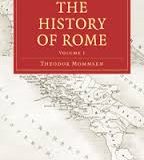The History of Rome – Theodore Mommsen – 1854
Reviewed by: Michael Sympson Date: 13 December 2001
First a word about Theodor Mommsen. He came to Roman history with a background at the bar and as an MP and legislator. His position in the house was that of a – how shall I put it – radical liberal nationalist, a rare colour these days, where liberalism has become a term of abuse. He fiercely opposed the politics of Otto von Bismarck, who just had defeated France and reunited Germany. So the perspective on constitutional law that underpins Mommsen’s entire work, came naturally to him, the old Roman understanding of history as the “Custom of Nations” had found a kindred soul and a speaker of supreme eloquence. In 1902, Mommsen received the Nobel-prize for literature.
Being an outspoken opponent to centralization, bureaucracy and anti-Semitism, Mommsen had the misfortune in his “Roman History” to coin a phrase which later should cast a shadow on his reputation. He described the Jews in exile as “an element of national decomposition,” and of course didn’t anticipate that extremists would be able to pick up on this and send Jews to the death camps. He was spared to witness the damage. Mommsen’s most important contribution to Roman history is the editing and publishing of the monumental “Corpus Inscriptionum Latinarum.” We lesser mortals are not likely to see this on our bookshelves at home, but for the archaeologist and historian it is an indispensable tool.
It is a complete survey of all the epigraphs and inscriptions unearthed anywhere in the Roman Empire and an ongoing project since 150 years and for as long as we continue to discover more inscriptions. Through it we know, for instance, that Pilate was not, as the gospels claim, a procurator, but a legate, and hence not accountable to the legate of Syria, which explains a good deal of the reckless atrocities during Pilate’s tenure. From this collection we also gain statistical insights in the average distribution of epigraphs and, corresponding to it, the degree of literacy in different parts of the empire at different times.
Mommsen himself considered as his main contribution his studies on Roman constitutional law and his editions of Roman law codices. He also discovered, edited, and published the “queen of all inscriptions,” Emperor Augustus’ Res Gestae:’ the Principe’s’ resume of his deeds and accomplishments. But what Mommsen made famous and earned him the Nobel-prize had originally been a mere potboiler, produced with incredible speed. Then Mommsen stopped in the middle of the work, only to take it up many years later for a two volume appendix on the Empire’s provinces. And yet this “Roman History” is the thing to have on your shelf, if you are interested in the subject.
I still can recall my awe when I turned the pages for the first time. Don’t get me wrong, this is not exactly a thriller, more a series of political and legal deductions on historical facts with a view on shifts and amendments in the Roman constitution. The story hovers in the background and Mommsen explains the meaning. But what explanation it is! The first few pages introduce us to Italy’s prehistory and deduce the paraphernalia of Indo-European migrations and early Roman society “simply” from the dictionary of the Latin language! It is mind-boggling suggestive. We hear of the early institutions, of King’s councilors who eventually formed the republics senate, but under the Etruscian Kings merely had the “right” to say “yes.” Not much of a right you may think and it did not include the right to say “no,” but one can always keep silent. (“You disagree?” — “Yes!!” Blimey.)
Then Mommsen moves on to the Punic wars and to the elder Cato’s prosecution of a foreign cult on Italy’s soil, which created a legal precedent that affected the prosecution of Christians some 200 years later. Mommsen discusses in great detail the introduction of the revolutionary office of the tribune and how the Gracci used the “tribunicia potestas” to blunt the executive powers of the Senate and briefly managed to assume the position of an (elected) head of state who was not a consul. Their revolutionary legislation however was soon to be overturned in Sulla’s conservative counter-revolution, which in turn mobilized the popular parties to bring a certain Caesar into power. But even in Mommsen’s glowing eulogy, Caesar is little more than a gifted politician and general whose political ambition made him commit high treason and suspend the constitution.
Mommsen stopped here. Characteristically the end of the Republic and its democratic institutions was for him the end of history proper. Mommsen could never bring himself to write about the emperors. In his eyes this would have amounted to little more than a gossipy chronicle of court scandals; and for this we have Gibbon. Still, it would have been interesting. But “it is in the agricultural towns of Africa, in the homes of vine-dressers on the Moselle, in the flourishing townships of the Lycian mountains, and on the margins of the Syrian desert, that the work of the imperial period is to be sought and to be found.”
At times opinionated and irate, Mommsen had a knack for outrageous statements and we catch glimpses of it in his later survey on the Roman provinces. He called Domitian, who according to Tacitus had been the best hated Emperor of his period, “the most careful administrator who ever graced the empire.” Or read Mommsen’s comment on Euripides and what he thinks about the poet’s influence on Hellenistic humanitarianism. It makes you put down the book and pause for a moment: “Is he serious?” I could go on and drool endlessly, it would never do justice to Mommsen’s work. If you can’t shell out 600 bucks, then go to your library and borrow it through the interlibrary exchange, but make sure you have enough time at your hand, really to sink your teeth into it.















